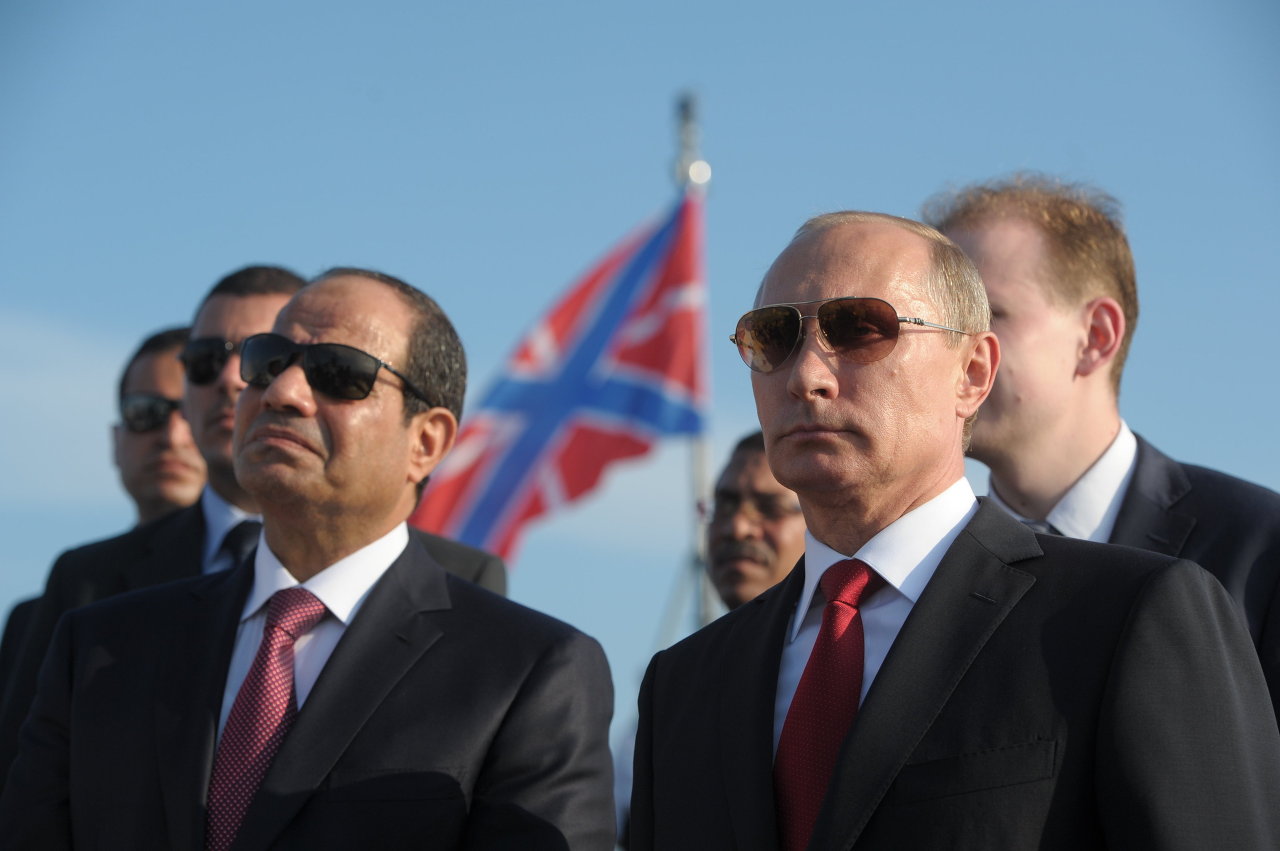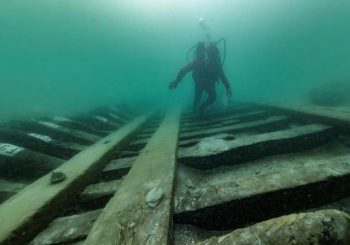Based on UN Charter Article 51 which Russian President Vladimir Putin invoked Tuesday after announcing that the downing of the Russian plane was an act of terror, Russia can strike ISIS strongholds wherever they may be.
Former Egyptian ambassador to Russia Ezzat Saad told Aswat Masriya on Wednesday that the Russians can strike ISIS strongholds in coordination with the Egyptian army. This could potentially include Sinai in Egypt and other ISIS strongholds in the region.
On Oct. 31, a plane operated by the Russian Metrojet airline crashed in the Egyptian Sinai desert, killing all 224 passengers and crew who were mostly Russian holiday makers. Egypt has since had to grapple with the dire consequences of the tragic incident, which put airport security under heavy scrutiny, taking a toll on the vital tourism sector.
President Abdel Fattah El-Sisi led a meeting of the Supreme Council of the Armed Forces on Wednesday. The Egyptian presidency said in an ensuing statement that the meeting addressed “internal security developments … especially in Sinai.”
This meeting comes one day after Russia said it found traces of explosives in the debris. The Egyptian state has not backed the bomb theory, reacting with a statement late Tuesday saying that there is no evidence of criminal activity “so far”.
The Russian claim that a handmade bomb downed the plane comes after an investigation that was clearly carried out separately from an Egypt-led international investigation, which includes Russian representatives. Egypt said it will take the Russian conclusions into consideration in its final investigation.
The Kremlin said that it will invoke the right to self defence in response to the terrorist act, a right guaranteed by UN Charter Article 51.
Speaking by telephone for the first time since the Russian announcement, Putin and Sisi agreed that their “intelligence services would work closely together on the effort to track down the criminals responsible for the terrorist attack,” according to a statement provided by the Kremlin.
Putin also briefed Sisi on the “intensification” of Russian operations in Syria, to include long-range aviation and naval units. According to the Russian news agency Interfax, Sisi supported the Russian proposal. Egypt has previously expressed support for the Russian strikes in Syria, which were launched in September, amid heavy criticism by the West and several Gulf countries.
In their phone call today Sisi and Putin said “additional measures will be put into place to ensure maximum security of flights between the two countries, in order to resume flights as soon as possible.”
Earlier this month, Russia suspended all flights to Egypt before banning EgyptAir flights from entering Moscow.
THE LEGAL LABYRINTH
While Article 51 of the UN Charter is barely seven lines long, it is a complex article for which scholars, academics and law experts have offered many interpretations.
It stipulates the “inherent right of individual or collective self-defence if an armed attack occurs against a Member of the United Nations.”
In 1987, the US regarded itself a victim of an “armed attack” by Iran and in response struck two Iranian oil platforms. In its judgment on the case in 2003, the International Court of Justice (ICJ) demonstrated that by doing so, the “burden of proof of the facts showing the existence of such an attack rests on the United States.”
Even after this step, the ICJ report shows that when a state resorts to the right to self defence, it must show that “its actions were necessary and proportional to the armed attack made on it.”
Article 51 also states that the country invoking this article must report to the UN Security Council the measures it plans to take to defend itself, but that the council retains the right to take any measures it deems necessary to maintain or restore international peace.
Additionally, the downing of the Russian plane was claimed by the Sinai-based affiliate of the Islamic State Fighters in Iraq and Syria, Sinai Province twice, which further complicates the application of Article 51.
In the traditional view, the “armed attack” must be attributed to a state, rather than a “non-state” armed group, according to a study written by lawyer Vidan Hadzi-Vidanovic who works at the European Court of Human Rights in 2011, published at the blog of the European Journal of International Law.
Prior to the U.S.’s invasion of Iraq in 2003, this is how the article was interpreted but the U.S. invasion changed matters.
Ambassador Saad said that after the invasion, the article’s interpretation was developed to consider acts of terror as “armed attacks” that justify invoking the article.
Hadzi-Vidanovic highlights that Article 51 does “not textually require that the armed attack be attributable to a state,” but adds that” if this reading is to be adopted, it would seem that it sets an especially high gravity threshold for irregular attacks to become armed attacks.”
Based on this more modern understanding of the article, Egypt struck what it said were terror targets belonging to a division of ISIS based in Libya in February, one day after 20 Egyptians were killed at the hands of men purporting to belong to the group.
Egypt said on Tuesday that the plane crash investigation may last a year or even longer. But if terror is confirmed to be the cause of the crash, then Egypt will not have to compensate the families of the Russian victims, international law professor at the University of Zagazig, Nabil Helmy told Aswat Masriya.
He added that insurance companies are the ones required to issue compensation in the case of terrorism, which seems to support the notion that the Egyptian state will not be held responsible for the incident.
RUSSIAN-EGYPTIAN TIES BEFORE THE CRASH
Prior to the plane crash, Egyptian-Russian ties were cosy and the two countries have made agreements earlier this year to cooperate on nuclear and military matters.
Sisi visited Russia in August and said Egypt is looking forward to benefiting from Russia’s experience in the peaceful use of nuclear energy.
He also said that his country awaits further military cooperation with Russia in fighting terrorism in the Middle East region. Russia had handed Egypt a Molniya missile ship that participated in the inauguration of the “New Suez Canal” earlier in August.
Egyptian-Russian trade exchange rose by 86 percent to reach $5.4 billion in 2014, the Ministry of Trade and Industry said on Monday. Egypt was the second largest importer of Russian wheat last year and Russian tourists constitute around 50 percent of guests in Egypt’s South Sinai resorts.
Putin visited Cairo in February, when he invited Sisi to an official visit to Russia and Sisi visited Russia twice in 2014, once as defence minister but de facto ruler in February, eight months after ousting Islamist president Mohamed Mursi, and a second time in August as president.
With the Russian ban on flights to Egypt, the flow of Russian tourism has already been affected but it is unclear if further cooperation between the two countries will shrink.
Russia’s transport minister said Wednesday that some 90,000 Russian tourists were evacuated from Egypt, with only under 2,500 to be repatriated by November 30.







Comments (22)
[…] What Will Russia’s Appeal to UN Charter ‘Right to Self-Defence’ Article 51 Mean for Egypt? – It stipulates the “inherent right of individual or collective self-defence if an armed attack occurs against a Member of the United Nations.” In 1987, the US regarded itself a victim of an “armed attack” by Iran and in … […]
[…] What Will Russia’s Appeal to UN Charter ‘Right to Self-Defence’ Article 51 Mean for Egypt? – It stipulates the “inherent right of individual or collective self-defence if an armed … Even after this step, the ICJ report shows that when a state resorts to the right to self defence, it must show that “its actions were … […]